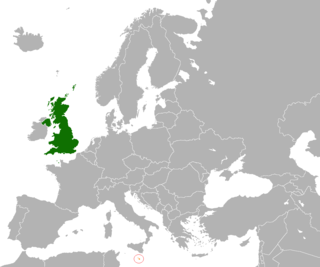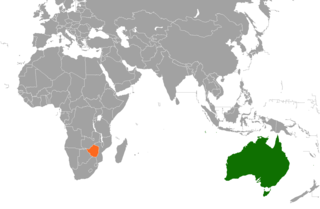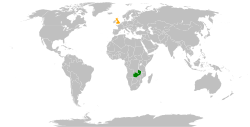
The Judicial Committee of the Privy Council (JCPC) is the highest court of appeal for the Crown Dependencies, the British Overseas Territories, some Commonwealth countries and a few institutions in the United Kingdom. Established on 14 August 1833 to hear appeals formerly heard by the King-in-Council, the Privy Council formerly acted as the court of last resort for the entire British Empire, other than for the United Kingdom itself.

Zambia, officially the Republic of Zambia, is a landlocked country at the crossroads of Central, Southern and East Africa. It is typically referred to being in South-Central Africa or Southern Africa. Its neighbours are the Democratic Republic of the Congo to the north, Tanzania to the north-east, Malawi to the east, Mozambique to the southeast, Zimbabwe and Botswana to the south, Namibia to the southwest, and Angola to the west. The capital city of Zambia is Lusaka, located in the south-central part of Zambia. The population is concentrated mainly around Lusaka in the south and the Copperbelt Province to the north, the core economic hubs of the country.
The history of Zambia experienced many stages from colonization to independence from Britain on October 24, 1964. Northern Rhodesia became a British sphere of influence in the present-day region of Zambia in 1888, and was officially proclaimed a British protectorate in 1924. After many years of suggested mergers, Southern Rhodesia, Northern Rhodesia, and Nyasaland were merged into the British Federation of Rhodesia and Nyasaland.

After independence in 1964 the foreign relations of Zambia were mostly focused on supporting liberation movements in other countries in Southern Africa, such as the African National Congress and SWAPO. During the Cold War Zambia was a member of the Non-Aligned Movement.

A Commonwealth realm is a sovereign state that has Charles III as its monarch and head of state. Charles succeeded his mother, Elizabeth II, as monarch of the Commonwealth realms immediately upon her death on 8 September 2022. All the realms are equal with and independent of the others, though one person, resident in the United Kingdom, acts as monarch of each.

Barotseland is a region between Namibia, Angola, Botswana, Zimbabwe including half of eastern and northern provinces of Zambia and the whole of Democratic Republic of Congo's Katanga Province. It is the homeland of the Lozi people or Barotse, or Malozi, who are a unified group of over 46 individual formerly diverse tribes related through kinship, whose original branch are the Luyi (Maluyi), and also assimilated Southern Sotho tribe of South Africa known as the Makololo.
In the Commonwealth of Nations, a high commissioner is the senior diplomat, generally ranking as an ambassador, in charge of the diplomatic mission of one Commonwealth government to another. Instead of an embassy, the diplomatic mission is generally called a high commission.

Malta–United Kingdom relations are foreign relations between Malta and the United Kingdom. The two countries share membership in the Commonwealth of Nations and the European Union up till 31 January 2020 when the UK withdrew from the bloc.

Cypriot–British relations are foreign relations between Cyprus and the United Kingdom. Cyprus gained its independence from the United Kingdom in 1960, after 82 years of British control. The two countries now enjoy warm relations; however, the continuing British sovereignty of the Akrotiri and Dhekelia Sovereign Base Areas has continued to divide Cypriots. The two countries share membership of the United Nations and the Commonwealth of Nations.

The diplomatic relationship between the United States of America and Zambia can be characterized as warm and cooperative. Relations are based on their shared experiences as British colonies, both before, after and during the struggle for independence. Several U.S. administrations cooperated closely with Zambia's first president, Kenneth Kaunda, in hopes of facilitating solutions to the conflicts in Rhodesia (Zimbabwe), Angola, and Namibia. The United States works closely with the Zambian Government to defeat the HIV/AIDS pandemic that is ravaging Zambia, to promote economic growth and development, and to effect political reform needed to promote responsive and responsible government. The United States is also supporting the government's efforts to root out corruption. Zambia is a beneficiary of the African Growth and Opportunity Act (AGOA). The U.S. Government provides a variety of technical assistance and other support that is managed by the Department of State, U.S. Agency for International Development, Millennium Challenge Account (MCA) Threshold Program, Centers for Disease Control and Prevention, Department of Treasury, Department of Defense, and Peace Corps. The majority of U.S. assistance is provided through the President's Emergency Plan for AIDS Relief (PEPFAR), in support of the fight against HIV/AIDS.

Pakistan–United Kingdom relations refer to the bilateral ties between the Islamic Republic of Pakistan and the United Kingdom of Great Britain and Northern Ireland. Both countries are members of the Commonwealth of Nations, and the United Kingdom is home to a large Pakistani diaspora population. Until 1956, Pakistan was nominally part of the British Empire as a post-independence federal Dominion in the aftermath of the partition of British India in 1947. The risk of abduction is prevalent across Pakistan, involving both terrorist organizations and criminal factions engaged in the act of hostage-taking.

Foreign relations exist between Australia and Zimbabwe. Both countries have full embassy level diplomatic relations. Australia currently maintains an embassy in Harare, and Zimbabwe maintains an embassy in Canberra.

Fergus Cochrane-Dyet is a British diplomat who served as High Commissioner to Zambia from April 2016 until August 2019, being succeeded by Nicholas Woolley. In 2011, while serving as High Commissioner to Malawi, he was declared persona non grata and expelled from the country because of controversial comments he made in a leaked diplomatic cable.

The Nation of Brunei, the Abode of Peace and the United Kingdom of Great Britain and Northern Ireland have formal diplomatic relations. Brunei has a High Commission in London, and United Kingdom has a High Commission in Bandar Seri Begawan. Both countries are members of the Commonwealth and share history and have a friendly and strong relationship, dating back to the 19th century - which includes very strong friendships between both countries' monarchs and royal families.

Kenya–United Kingdom relations are bilateral relations between Kenya and the United Kingdom. The interactions between the two states have been positive and friendly since Kenya's independence in 1963. Both the UK and Kenya are members of the Commonwealth of Nations and engage with each other regularly on matters of military, economic and cultural importance. Kenya retains many aspects of British culture and governance, such as continuing to use English within administration, education and the law, driving on the left, hosting a diaspora community of Britons, and having a large Protestant population. The British military continues to play an important role in the country with Kenya hosting the UK's largest base in Africa, which provides vital anti-terrorism training to the Kenyan police. The British royal family, in particular the Queen had very close personal ties to the country. Elizabeth II was in Kenya when she received news that her father King George VI had died, and had made multiple state visits throughout her reign. To mark the 2022 Platinum Jubilee, Prince Edward visited the country to reinforce ties and celebrate Kenya's historic and current relationship with the UK. British tourism and finance are significant contributors to the Kenyan economy, with 100,000 British people visiting the country ever year for its national parks and wildlife.

Zambian nationality law is regulated by the Constitution of Zambia, as amended; the Citizenship of Zambia Act; and various international agreements to which the country is a signatory. These laws determine who is, or is eligible to be, a national of Zambia. The legal means to acquire nationality, formal legal membership in a nation, differ from the domestic relationship of rights and obligations between a national and the nation, known as citizenship. Nationality describes the relationship of an individual to the state under international law, whereas citizenship is the domestic relationship of an individual within the nation. Commonwealth countries often use the terms nationality and citizenship as synonyms, despite their legal distinction and the fact that they are regulated by different governmental administrative bodies. Zambian nationality is typically obtained under the principals of jus soli, i.e. birth in Zambia, or jus sanguinis, i.e. by birth to parents with Zambian nationality. It can be granted to persons with an affiliation to the country, or to a permanent resident who has lived in the country for a given period of time through registration.














